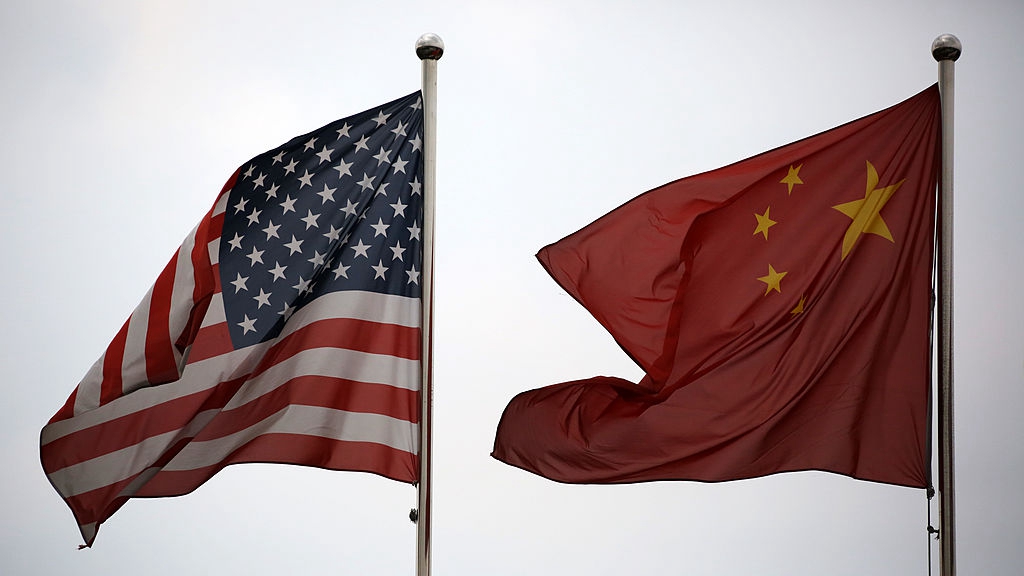
U.S. and Chinese national flags, October 22, 2013. /Getty
U.S. and Chinese national flags, October 22, 2013. /Getty
Editor's note: Hannan Hussain is a foreign affairs commentator and author. He is a Fulbright recipient at the University of Maryland, the U.S., and a former assistant researcher at Islamabad Policy Research Institute. The article reflects the author's opinions and not necessarily the views of CGTN.
On July 27, U.S. Defense Secretary Lloyd Austin delivered his "Imperative of Partnership" speech to the International Institute for Strategic Studies (IISS) in Singapore – a key anticipation of his ongoing Asia trip, aimed at marketing U.S. influence and credibility in a so-called "powerful network of allies and partners" in the region.
"Our strategic partnerships can carry us all closer to the historic common project of a free and open Pacific, at peace with itself and with the world … a stronger, more stable regional order where countries resolve disputes amicably and uphold all the rights of all their citizens,"remarked Austin.
Yet, fracturing the defense secretary's appeal to controversial maritime-domain awareness measures, Quad-like regional security architecture, and democratic continuity in Asia is his relentless fixation with an imagined China threat. Just take his public broadside against China's territorial sovereignty, its maritime rights in the South China Sea, and national defenses – all three elements strike at the heart of a simmering U.S. obsession and associated Asian assurances: a recipe for foreign interference without a trace of lasting peace.
On the maritime front, Austin wrongly alleges that China's claims in the South China Sea have "no basis in international law" and that such conjecture somehow forms the common view of Indo-Pacific countries as well.
First, what the Pentagon chief appears to ignore is the demonstrated conformity of Beijing's maritime rights with key international law standards, which includes the United Nations Convention on the Law of the Sea (UNCLOS).
Such an evidence-free approach to maritime allegations thus empowers Washington to presume charge of dubious territorial "rights" as a self-identified alternative, highlighted by a compromised relaunch of invalidated U.S. assurances to Japan vis-à-vis China's Diaoyu Islands.
Where is the evidence that regional countries view such tired U.S. maneuvers as their intersecting common principles? This is where Austin's "strategic imperative of partnership" mantra is at its weakest, as select powers make their reservations known.

U.S. Defense Secretary Lloyd Austin at a press conference, April 11, 2021. /Xinhua
U.S. Defense Secretary Lloyd Austin at a press conference, April 11, 2021. /Xinhua
A similar thread ties into the Pentagon chief's glaring contradictions on what is billed as a "constructive, stable relationship with China." It is true that such a high-level reset was given a credible lifeline by China at several junctures in the past, but Austin's accompanying denunciation of China's military progression, foreign collusion countermeasures, and law and order reforms reveal precisely why Washington's seasonal rhetoric on U.S.-China stability has no takers.
More importantly, Austin's remarks also reveal fresh gaps in projected and practiced U.S. motivations towards Beijing's ironclad one-China policy. For instance, the Pentagon chief framed unwarranted U.S. support for so-called threats and coercion in Taiwan region as an effort broadly in line with U.S. commitments to a unified China.
The mother of all indictments escapes no one: not only is Beijing slamming the brakes on Washington's futile and unchecked narrative liberties, the Asian audience that Austin aims to placate won't operate on a one-China principle skewed to Washington's political advantage.
This is important because the effective motivation behind Austin's Asia pivot is to convince regional countries that Washington's "vital interests" intersect with their own. And based on that very assumption, pronounce that sense of unity as "threatened" once faced with a reality check.
But such a wishful calculus from the top U.S. Defense official merits some disagreement. The single fact that the Pentagon is increasingly leaning on "China" as a rationale to sell anything Indo-Pacific, is a sign that the strategy has nothing standalone to offer as a service to its multilateral projection in Asia.
Instead, the demand still appears to be the same: to have a U.S.-China duel endorsed on the back of tired rules-based-order rhetoric.
Asian powers have heard that before.
(If you want to contribute and have specific expertise, please contact us at opinions@cgtn.com.)

